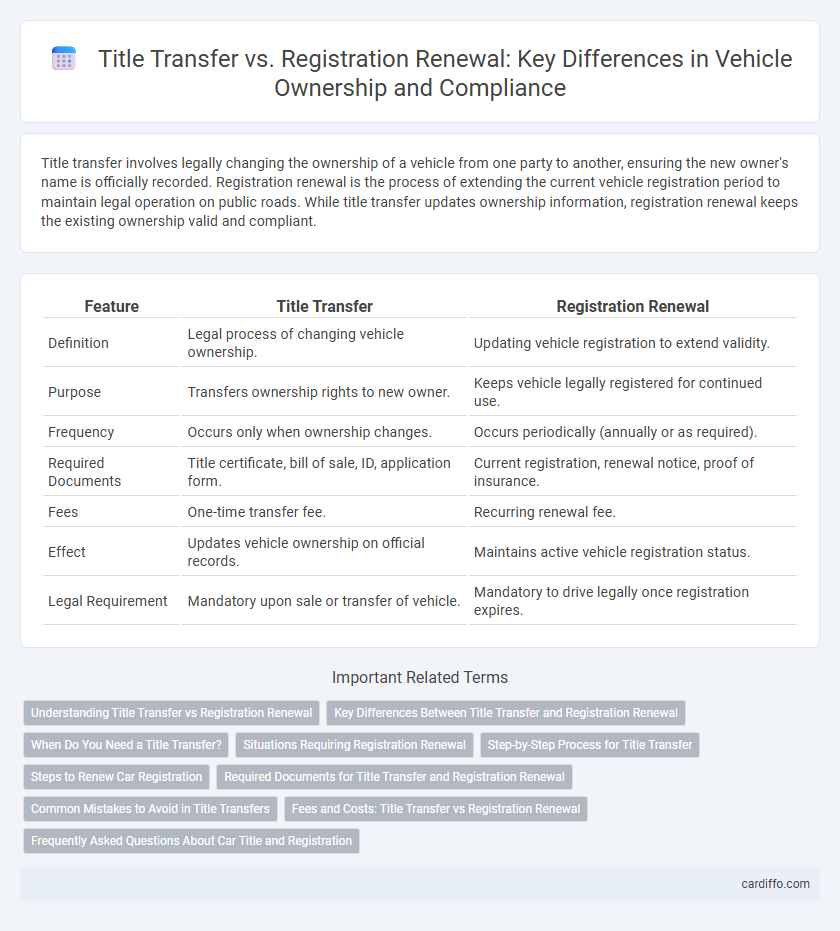Title transfer involves legally changing the ownership of a vehicle from one party to another, ensuring the new owner's name is officially recorded. Registration renewal is the process of extending the current vehicle registration period to maintain legal operation on public roads. While title transfer updates ownership information, registration renewal keeps the existing ownership valid and compliant.
Table of Comparison
| Feature | Title Transfer | Registration Renewal |
|---|---|---|
| Definition | Legal process of changing vehicle ownership. | Updating vehicle registration to extend validity. |
| Purpose | Transfers ownership rights to new owner. | Keeps vehicle legally registered for continued use. |
| Frequency | Occurs only when ownership changes. | Occurs periodically (annually or as required). |
| Required Documents | Title certificate, bill of sale, ID, application form. | Current registration, renewal notice, proof of insurance. |
| Fees | One-time transfer fee. | Recurring renewal fee. |
| Effect | Updates vehicle ownership on official records. | Maintains active vehicle registration status. |
| Legal Requirement | Mandatory upon sale or transfer of vehicle. | Mandatory to drive legally once registration expires. |
Understanding Title Transfer vs Registration Renewal
Title transfer involves legally changing the ownership of a vehicle from one party to another, requiring submission of a completed title application and payment of applicable fees. Registration renewal is the process of extending the vehicle's registration period without changing ownership, typically necessitating proof of insurance, emissions testing, and payment of renewal fees. Understanding these distinctions ensures compliance with state laws and prevents penalties or legal complications.
Key Differences Between Title Transfer and Registration Renewal
Title transfer involves changing the legal ownership of a vehicle, requiring submission of the signed title, proof of identity, and payment of transfer fees, while registration renewal is the process of extending the period a vehicle is legally allowed on the road by paying periodic fees and updating insurance or inspection documents. Title transfer usually occurs during vehicle sales or ownership changes, whereas registration renewal is an annual or biannual requirement to maintain valid vehicle operation status. Understanding these distinctions ensures compliance with motor vehicle laws and avoids penalties or legal complications.
When Do You Need a Title Transfer?
A title transfer is required when ownership of a vehicle changes hands, such as after a sale, gift, or inheritance, to legally document the new owner. Registration renewal only updates the vehicle's registration status with the DMV, ensuring it remains legally operable and insured. Title transfer must be completed before or during the registration renewal process when ownership changes to avoid penalties or suspension of registration.
Situations Requiring Registration Renewal
Registration renewal is required to maintain the legal validity of a vehicle's registration after its expiration period, typically annually or biennially depending on jurisdiction. It ensures continuous compliance with road safety regulations, updated ownership records, and payment of necessary fees or taxes. Unlike title transfer, which changes vehicle ownership, renewal focuses solely on extending the current registration's validity for ongoing use.
Step-by-Step Process for Title Transfer
Title transfer requires submitting the signed vehicle title, completing a title transfer application, and paying the applicable fees at the local Department of Motor Vehicles (DMV). The process includes verifying the vehicle identification number (VIN), obtaining a new title in the buyer's name, and updating the ownership records. Registration renewal involves paying the annual fee and ensuring the vehicle meets emission and safety standards but does not change ownership details.
Steps to Renew Car Registration
Renewing car registration involves several key steps, including verifying vehicle information, paying applicable renewal fees, and submitting required documents to the Department of Motor Vehicles (DMV). Title transfer differs as it requires transferring ownership by submitting the signed title, along with a transfer application and paying title transfer fees. For registration renewal, vehicle owners must ensure compliance with emissions tests and insurance requirements before completing the renewal process online or in-person.
Required Documents for Title Transfer and Registration Renewal
Title transfer requires original vehicle title, proof of identity, and bill of sale to establish legal ownership. Registration renewal demands current registration card, proof of insurance, and payment of renewal fees to maintain vehicle legality. Both processes may require emissions test certificates depending on state regulations.
Common Mistakes to Avoid in Title Transfers
Common mistakes to avoid in title transfers include failing to complete the transfer within the legally required timeframe, which can result in penalties or fines, and neglecting to verify the accuracy of the buyer's information, leading to potential legal complications. Another frequent error is confusing title transfer with registration renewal, where registration renewal only updates vehicle information with the DMV without changing ownership, while title transfer legally documents the new owner. Ensuring all forms are correctly signed and submitted to the appropriate state agency prevents delays and secures proper documentation of ownership change.
Fees and Costs: Title Transfer vs Registration Renewal
Title transfer fees typically involve a one-time payment that covers the administrative cost of updating vehicle ownership records, often ranging from $15 to $100 depending on the state. Registration renewal fees are recurring annual or biennial charges, commonly between $20 and $150, that maintain a vehicle's legal status for road use. Understanding these distinct cost structures helps vehicle owners budget accurately for ownership transfer versus ongoing registration obligations.
Frequently Asked Questions About Car Title and Registration
Car title transfer is the legal process of changing vehicle ownership, while registration renewal updates the vehicle's active status with the DMV for continued road use. Common questions include how long the title transfer takes, the required documents like the signed title and bill of sale, and whether title transfer is mandatory before registration renewal. Many also inquire about fees, deadlines, and penalties associated with late renewal or transfer.
Title Transfer vs Registration Renewal Infographic

 cardiffo.com
cardiffo.com